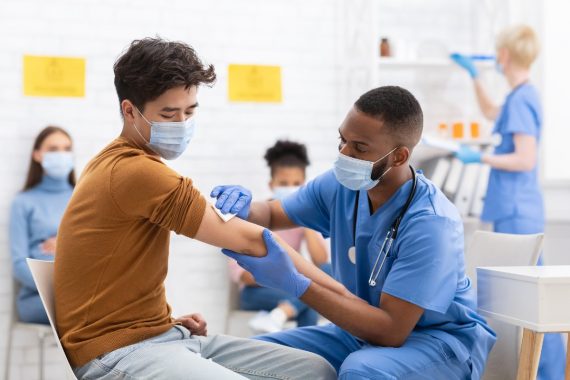The UK medicines regulator has told Pulse it still is ‘scrutinising’ child Covid vaccine trials to consider whether vaccination should be extended to younger ages.
It comes as US regulators approved the Pfizer Covid-19 vaccine for use in children aged 12 to 15.
The Food and Drug Administration (FDA) said it would be amending the emergency use authorisation after the vaccine manufacturers applied to extend its use into younger age groups.
In response to a query from Pulse, the Medicines and Healthcare products Regulatory Agency (MHRA) said carefully designed paediatric trials were ongoing.
Currently neither Pfizer/BioNTech nor the Oxford/AstraZeneca vaccine are authorised for use in children in the UK.
While Pfizer has reported that its vaccine is ‘100% effective’ in children aged 12-15, the University of Oxford has told Pulse it has ‘postponed’ vaccinations in its AZ vaccine paediatric study ‘to allow further discussions with the MHRA’ following the reports of rare blood clots.
Dr Siu Ping Lam, director of licensing at the MHRA, said: ‘Carefully designed and conducted paediatric trials, aimed at generating evidence on appropriate doses and dosing schedules, safety and immunogenicity data remain under close scrutiny by the MHRA, in collaboration with clinical investigators and sponsors.
‘Once further information becomes available, the MHRA will consider whether authorisations should be updated, to support safe and effective use in children.’
It follows reports in February that the Covid vaccine will ‘almost certainly’ be rolled out to children later in the year and potentially as soon as August.
In announcing the US changes to vaccine authorisation, acting FDA commissioner Dr Janet Woodcock said the agency undertook a rigorous and thorough review of all available data.
‘Today’s action allows for a younger population to be protected from Covid-19, bringing us closer to returning to a sense of normalcy and to ending the pandemic,’ she said.
Professor Azeem Majeed, professor of primary care at Imperial College London said he believed it was very likely that the MHRA would follow other countries and approve Covid-19 vaccines for use in older children.
He said: ‘This then may lead to a programme to immunise children 12 and over either later this year or sometime in 2022.’
He added in general he was supportive of the idea of Covid-19 vaccination in children because of the risk of them developing longer term problems from infection but also that it would help help protect their parents, older relatives and teachers.
UK paediatricians have said there will be a delicate balancing act when considering vaccination in children and adolescents while many vulnerable adults globally had not yet been immunised.
Professor Adam Finn, professor of paediatrics at the University of Bristol, said: ‘It is important that we have confirmation of the safety and adequacy of immune responses of Covid-19 vaccines in children – particularly because there are some children who are at enhanced risk of serious illness because they have underlying health conditions that render them more vulnerable.’
But he added most children infected with Covid-19 do not get seriously ill or even sick at all and the importance of children in transmission of the virus within the community is not entirely clear which means that, for now, immunising children is a low priority.
He added: ‘If vaccine-induced protection in the adult population is high from high uptake, good persistence of protection and sustained protection against viral strains as they evolve to evade immunity, then it may not be necessary to immunise children in a general way at all.’
Professor Russell Viner, professor of adolescent health at University College London, said: ‘The signals thus far are that the Pfizer vaccine appear very safe in teenagers although data have only been reported and not yet formally published.’
He warned the amount of safety data on the vaccine – and future data from children’s trials – only number in the thousands.
He said: ‘We need current data to be publicly available, data on larger numbers and to have ethicists and young people themselves involved in discussions and decisions about whether to vaccinate teenagers later this year.’
Health secretary Matt Hancock told the House of Commons on Monday 17 May: ‘I have been closely following the results of the clinical studies from Pfizer that show that the vaccine is safe and effective among children between the ages of 12 and 18. We have procured enough Pfizer to be able to offer that jab to children should that be clinically approved here…
‘We are on track to meet the target of offering the vaccine to all those aged 18 and above by the end of July, so we have a couple of months before we need to make and operationalise a decision. We want to be very, very careful and sensitive about whether and how we offer the vaccine to children.’
Pulse October survey
Take our July 2025 survey to potentially win £1.000 worth of tokens














